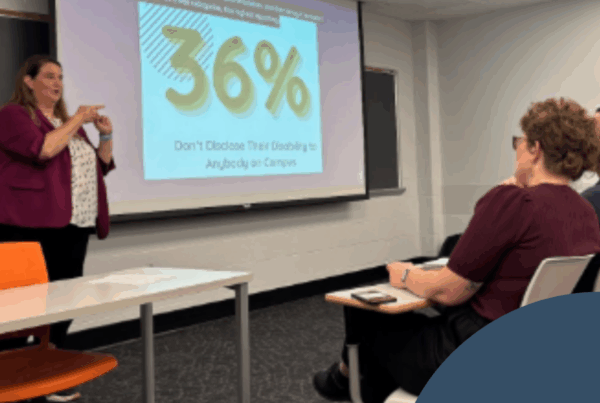Summary
Disability Is Human engages and equips readers with relatable stories, real-world examples, and actionable tips.

Recognizing a gap on bookshelves, National Disability Center Executive Director Stephanie W. Cawthon, PhD, has published a new book that seeks to dispel myths and raise expectations about disabled people.
In Disability Is Human: The Vital Power of Accessibility in Everyday Life, Dr. Cawthon draws upon more than twenty five years of experience as a professional educator and researcher to write a practical book aimed at a broad, general audience — and to write its companion volume, Disability Is Human: The Vital Power of Accessibility in Everyday Life | The Official Workbook, for readers who want to dive deeper into the book’s hands-on strategies and activities.
Both are available now at booksellers online and worldwide.
A Breakthrough Book
With relatable stories, real-world examples, personal experiences, and actionable tips, Disability Is Human is a breakthrough book that:
- Provides key building blocks to tap the vital power of accessibility
- Boosts understanding of disability
- Explains “ableism,” how to identify it, and ways to address it to improve accessibility for everyone
It is a call to a deeper connection to and an understanding of what is often ignored, forgotten, or deemed of lesser value.
“For so many years, disabled people have fought to be seen. To be recognized. To have the barriers that are so prevalent in our society removed so that we can go about our lives, our businesses, and our relationships in a way that is authentic to who we are,” says Dr. Cawthon, who was born deaf and uses hearing aids and sign language as well as spoken English.
The Center’s growing body of research is also critical to Dr. Cawthon’s mission to remove barriers for disabled people.
“Our work at the National Disability Center is critical for the millions of disabled college students at American universities, many of whom don’t disclose their disabilities to friends or instructors out of fear of stigma, bias, or misunderstanding,” said Dr. Cawthon.
Disabled people experience high levels of discrimination, bullying, unemployment, reduced access to healthcare, exclusion from faith communities, and more. These impacts can be compounded for people who experience additional discrimination due to intersectional identities such as race, ethnicity, gender and gender identity, class, immigrant status, and sexual orientation.
Engage and Equip Readers
The book seeks to engage and equip readers to make a positive difference in their own life and in the lives of the people in their orbit. The possibilities exist — people just need to tap into them and take steps, both big and small. Cawthon has spent years talking with people about disability and how to put actionable strategies into practice.
Through the stories, insights, and reflections in Disability Is Human, Dr. Cawthon focuses on three key components of transformational change:
- Connecting to disabled people and their experiences of disability
- Uncovering where ableism is embedded in home, work, school, and community
- Identifying accessibility strategies that can be put into action
For more information, visit Dr. Cawthon’s personal website: www.StephanieCawthon.com.


